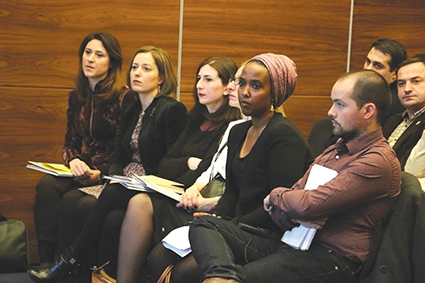Consolidating IDP Integration in Georgia: Final Conference Held
The Danish Refugee Council (DRC) in the South Caucasus held a conference to close the first phrase of the project 'Consolidating IDP Integration in Georgia' on November 29 in Radisson Blu Iveria Hotel Tbilisi, funded by the Bureau of Population, Refugees, and Migration – US Department of State.
The conference focused on the theme of challenges of IDP integration and its perspectives in Georgia, bringing government officials and NGO representatives together to discuss new initiatives and programs in the social policy sphere and the necessary mechanisms to make local/municipal services accessible for the IDP population.
The DRC Consolidating IDP Integration in Georgia project aims to provide legislative support to IDPs and to strengthen their integration into local communities. The project was realized in 5 Georgian cities: Kutaisi, Tskhaltubo, Poti, Zugdidi and Senaki. 1,870 families were profiled in 11 IDP settlements within a project during which 44 informational meetings were organized with 595 IDPs attending. During the six thematic workshops, the needs for the protection of IDP rights, their inclusion in social and health programs and again access to the local and municipal services were highlighted. 10,000 leaflets were distributed with information on available services and providers in the region.
“The protected isolation of IDP communities in Georgia has led to complex social and economic challenges, thus IDPs remain in need of assistance even though significant time has passed since their displacement,” said Svend Monrad Graunboel, Country director, DRC Georgia and South Caucasus. “IDPs and vulnerable groups have an important role to play in any country’s development. As such at DRC we believe that empowering the sustainable self-reliance of IDPs through access to employment, documentation and property rights and participation should be seen as a central part of the general development strategy for Georgia” he said, adding that the Government of Georgia has made significant progress towards IDPs attaining durable solutions through their displacement. “The reforms initialized clearly address the needs of vulnerable groups but there is still much to be done,” Graunboel said.
According to official data, in 2015 the unemployment rate in Georgia hit 12 percent and although there is no official data available, the unemployment rate among IDPs is much higher than within the local population. According to the World Bank report 2013, 80 percent of IDPs consider themselves unemployed.
The research undertaken by DRC shows that one of the major challenges for the solving long term problems endured by IDPs is a lack of employment opportunity perspectives and livelihood resources. In order to address the issue, one of the many recommendations given is to promote small and medium scale enterprises. Establishing funds that will provide low interest rate loans is also seen as a solution, alongside training programs that will focus on developing entrepreneurial and business management skills for IDPs. While the program Produce in Georgia already exists, initiated by the Government of Georgia, it is still not tailored to the needs of IDP and vulnerable groups, and this is only one of the many challenges that need to be addressed, alongside issues related to offering land rent opportunities for IDPs, implementation of vocational training programs, and updating the existing data resources on available service providers and programs.
“We’re open to discuss the best possible models for the IDP integration,” said Grigol Giorgadze, First Deputy Minister, Ministry of IDPs from the Occupied Territories, Accommodation and Refugees of Georgia. “It is very important to maximize engagement from all parties, be it state or public sector. We have to pay close attention to what is done towards the integration process, to make further steps to move from status to needs; we need to see to what extent IDPs have access to the services and social programs the state provides.”
Presentations were then made by a number of guest speakers.
Amiran Dateshidze, Head of the Social Affairs and Programs Division of the Social Protection Department within the Ministry of Health, Labor and Social Affairs of Georgia, on access of IDPs to municipal services, talked about social programs initiated by the government to assist families in need, families with children with disabilities, children with hearing disabilities and more. “A mother-and-child shelter was opened where women have a chance to get help to find employment and, with another recent initiative, orphans have been moved to live in foster families, which is believed to help their integration into society.”
Murad Abotia, Head of the IDP Department, Ministry of IDPs from the Occupied Territories, Accommodation and Refugees of Georgia, talked about the role of municipalities in providing housing for IDPs. He mentioned that almost 70 percent of the IDP population is located in urban residential areas, where access to services, municipality programs and employment is easier. Abotia also said that Gori, Zugdidi, and Kutaisi municipalities are actively involved in supplying IDPs with housing.
Khadra Elmi, Durable Solutions Project Coordinator of the Joint IDP Profiling Service, shared her observations gained while in Georgia, and suggested a detailed durable solutions analysis be made, “comprehensive with an established time-bound working group to guide a secondary data review process that would collect the indicators of durable solution analysis in Georgia, to later be contextualized.” This collective set of joint recommendations would prioritize policy and development interventions within Georgia.
As Raimonds Pavlovkis, Regional Refugee Coordinator, Bureau of Population, Refugees, and Migration, US Department of State underlined, Georgia must take into account what has been accomplished and what still needs to be done. “Integration happens in stages, but transition between the stages is an evolutionary process,” he said, adding that the Government of Georgia has successfully laid the foundation for an integration policy through services and programs. For the next stage of integration, the base is to ensure that all the programs and services provided by the government remain accessible to IDPs. “While work is still ongoing, it may be considered as a success.”
Nino Gugunishvili












